- Learning time
- 90 minutes
- First play time
- 180 minutes
Polis
Designed by: Fran Diaz
Polis is a two player game of political and military control of ancient Greece. With the threat of Persian conquest seen off, the two strongest city-states (-the polis of the title) of Athens and Sparta are now struggling to shape Greece’s future. In the game, you play either the Athenians or the Spartans, and over three game years strive to generate the most prestige points: at the end of the third year, the player with most prestige wins.
The board shows a fairly large map of Greece split into several regions, most of which contain one or more polis. Players start with three such polis, with discs on the board to denote control (red for Sparta; blue for Athens). The board is also seeded with several cubes representing hoplites (military units) on land, or galleys at sea. Finally each player starts with a proxenos and merchant under their control – more on those in a bit.
Broadly speaking the object is to outperform your opponent, and of necessity this will increasingly segue into outfighting them: although Polis is not and out-and-out war game, combat is a considerable aspect of the second and third years. On your turn, you’ll take two actions – and you have no less than eleven actions to choose from. Rather than list them all here we’ll just give a brief overview. You can move hoplites and galleys around the map, which you’ll want to do because control of territories is important – both in terms of scoring points and gaining the resources produced by territories. Movement rules are simple but also vital to consider: the gist being you can leave a territory shared with an enemy, but not pass through enemy territories.
Control is also important for creating more hoplites and galleys, which you’ll want to do to maintain and defend the polis you take command of. The neutral polis don’t sign up to your cause by default either; you must lay siege to them to take control, which can have a negative effect on your military presence if things go badly. Taking control of a enemy polis is a little more tricky, and involves your proxenos visiting the polis in question and sowing political discord – which involves bribery, and so costs you silver.
Money is just one critical resource in Polis. It can be used as something of a wild card – just like life really – to pay for things you don’t have the resources for yourself. Hoplites and Galleys, for instance, can be made with iron and wood respectively. But if you have cash instead, you can pay silver. You can trade in resources at one of five foreign markets on the board using your merchant, for instance cashing in grapes for silver, or the much-sought-after wheat. All of these resources are tracked – along with prestige itself, which functions as a sixth economy of sorts, paying for certain actions – on your own player board. The reason wheat is so precious is at the end of each year you need to feed the population of each polis under your control: failing to do so means they will basically abaodon you and go back to a state of neutrality.
Finally, each side also has the option of developing a project: the building of a theatre, say, or the enticement of Socrates to your cause. These are all actually very simple, just demanding a number of resources in return for points. But certain projects can only be built in certain territories – the aforementioned Socrates, for example, can only reside in Athens or Syrakousae. And once installed in Syrakousae that polis becomes that much more attractive to your opponent to snatch away from you.
Around this beating heart of prestige>demands expansion>demands sustenance>demands trade are a few other little wrinkles to consider: the Events at the start of each round mix in a degree of randomness; the way battles are resolved using a bespoke deck of cards (long story short: outnumber your opponent if you can!); the option for population growth at the end of each round facilitating more prestige – and more. There’s a lot to consider, and Polis is not a game to be taken lightly.
The guru's verdict
-
Take That!
Take That!
At first peripheral, the combative elements of Polis come increasingly to the fore as the game's narrative plays out
-
Fidget Factor!
Fidget Factor!
High on a first play; dropping to moderate or even low for two regular opponents.
-
Brain Burn!
Brain Burn!
The eleven actions aren't really brain-burning, as they're all narratively logical and simple to execute. Really, the grey matter gets a work out from Polis in managing the various economies: not just the silver, food, prestige and others on your board, but the economy of military presence and - crucially - control.
-
Again Again!
Again Again!
There's a quite extraordinary amount ways this battle can go - though your overall objective doesn't change from game to game (get the most points) the routes to victory are many, with the events and projects giving just enough wobble to give proceedings variation without feeling like the overall story is compromised.

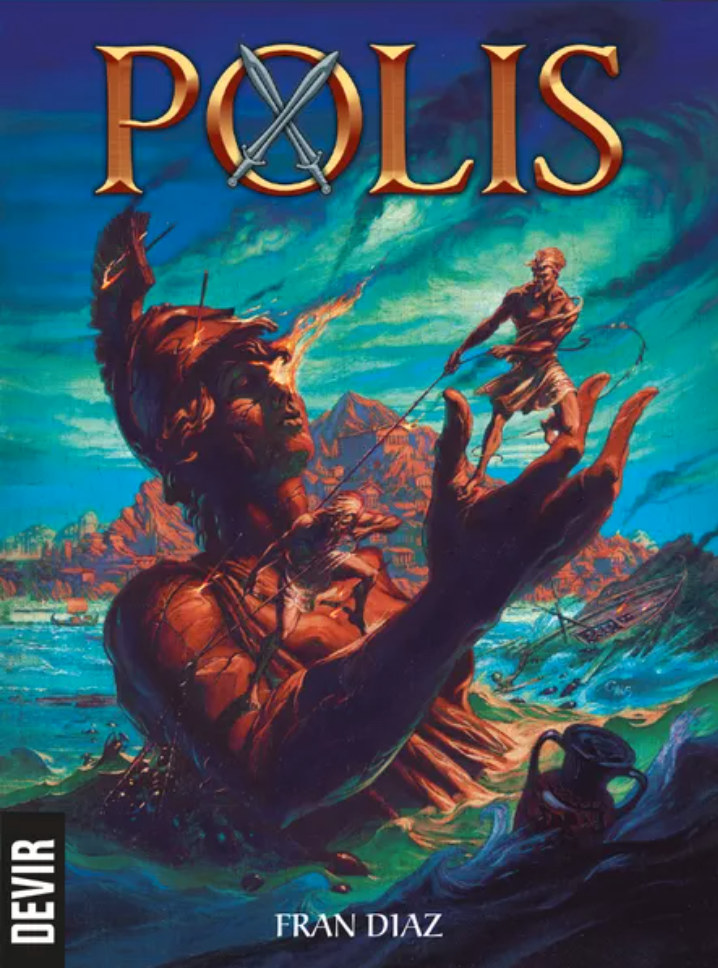
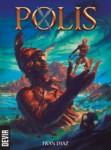
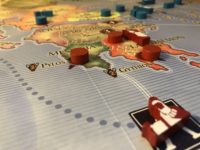
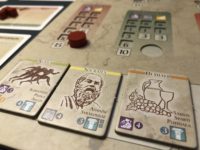
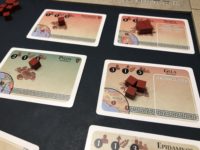
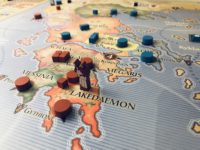
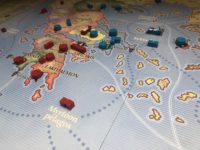



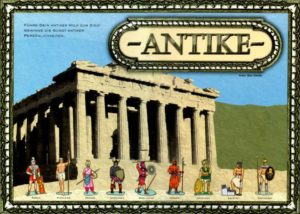
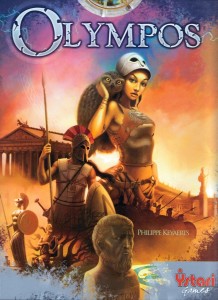
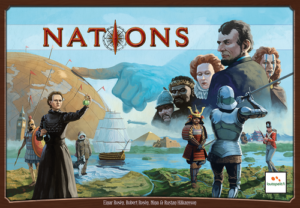
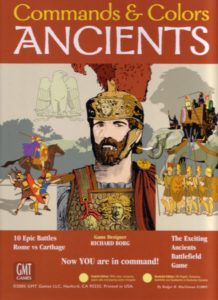
Sam says
Not be taken lightly; and yet not too overwhelming either - at least after a couple of plays. Somewhere between a war game and a resource management game and history game, arriving on the doorstep with the promise of both bluff and brinkmanship, Polis (we're describing the second edition here) at first glance might seem like the guy who came to a swinging sixties party dressed as Georgios Rallis. It doesn't appear to scream fun, and looks almost po-faced compared to many contemporaries. But dig a little deeper and Polis' true colours aren't too far away: eleven actions does sound a lot, but each of them are simple, and - combined with the handy player aids - familiarity brings a speed to play that transforms Polis into a build-and-destroy battle that can be over in as little as an hour. There's a lot of variety to be found in that 60+ minutes too - although very little varies in the set-up, player decisions and, perhaps critically, player priorities, have ramifications for the rest of the game. The combat system, initially seeming slightly tacked-on, provides a series of mini-games within it, and the ability to retreat throws in additional tactical nuance. In fact, tactical nuance might be the key phrase to sum up Polis: for each player the goals are simple, and yet how they are achieved is where the magic of the game lies.